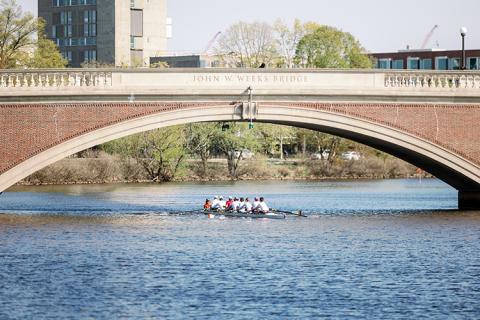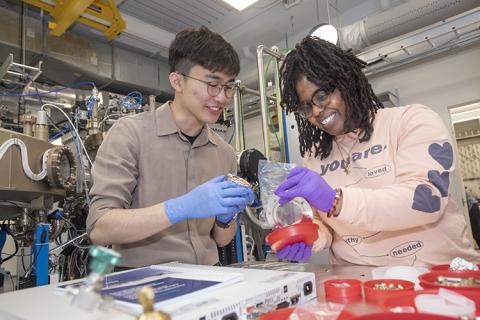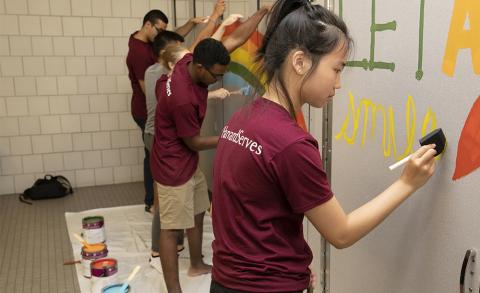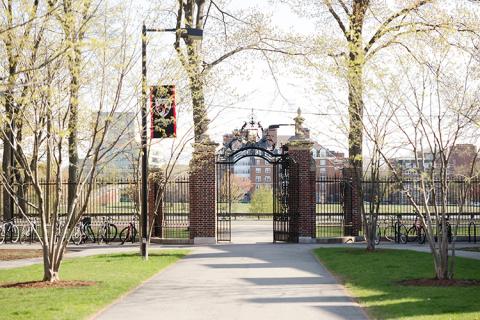
Summer Opportunities Guide

What can I do this summer?
With chances to pursue your personal and academic interests through internships, study abroad, public service, or spending time with friends and family, there’s something for everyone. There is no magic formula or “right” way to spend your summers during your time at Harvard College. While it’s exciting to be able to take advantage of a multitude of academic and professional offerings, there is also value in being able to take a break and use the summer to recharge. Keep in mind that you don’t have to do everything or anything!

How do I know which opportunity is right for me?
There are a multitude of ways to pursue your interests during the summer. Before foraying into the realm of possibilities, determine your personal, professional, and academic goals. Ask yourself questions, narrow down your interests, and seek out more information about opportunities that interest you. Some questions you should consider to help inform your decision include:
- What are my overall academic goals?
- What are some interests I have yet to explore?
- What are some interests I want to explore further?
- What programs, companies, organizations, or institutions align with my values?
- What opportunities can I pursue now and which ones may be for term-time or future summers?
- What do I need for my health and well-being?
You can discuss your potential summer opportunities with career advisors at the Mignone Center for Career Success (MCS), your academic advisors, your Peer Advising Fellows (PAFs), faculty members, advisors at the Office for Undergraduate Research and Fellowships (URAF), advisors at the Office for International Education (OIE), Phillips Brooks House Association (PBHA) staff, Center for Public Service and Engaged Scholarship staff, student group leaders, proctors and tutors, Resident Deans, and Faculty Deans. All of these advisors in your network will have unique experiences and perspectives that they can share with you. They can help guide you to the opportunities that might be the best fit for your interests, but ultimately the decision will be up to you!

Where do I begin?
It’s helpful to get a broad understanding of what opportunities exist, what they entail, and what offices facilitate them.

Taking a break
Summer break is designed to be just that: a break. Your time at Harvard can be challenging, and as such, you should feel empowered to take the time to recharge and gear up for the school year ahead. During the summer, ensure that you are eating well, getting enough rest, and doing things to energize your mind and body.
Here are five benefits associated with rest:
- Rest improves your memory
- Rest will boost your energy
- Rest will help you reduce stress
- Rest improves your overall health
- Rest can boost performance and creativity
Traveling, spending quality time with loved ones, taking some time to get outdoors, checking off items on your bucket list, and resting can be some of the most beneficial things you can do to improve your overall health and ability to fully show up and engage the following fall semester. Don't feel bad about leaving your summer open. Downtime is essential to help you avoid college burnout!

Research
Research is motivated by a question that prompts further exploration, sometimes by faculty members and sometimes by students. At Harvard, undergraduates are guided by a mentor during their summer research experience and depending on the scale of the project, you might be working alone or with a team. You can conduct research in any field and within any concentration.
-
- Research Village
- Program for Research in Science and Engineering (PRISE)
- Build Learning through Inquiry in the Social Sciences (BLISS)
- Program for Research in Markets and Organizations (PRIMO)
- Summer Humanities and Arts Research Program (SHARP)
- Summer Undergraduate Research in Global Health (SURGH)
- Summer Program for Undergraduates in Data Science (SPUDS)
- Identifying a professor or group to conduct independent research and applying for funding (or course credit)
- Harvard-Amgen Scholars Program
- External Research Opportunities (non-Harvard affiliated)
- Research Village
-
Depending on where you are in your research career, you can find yourself benefiting differently from the experience. For some, especially first-years and sophomores, summer research can be a great opportunity to discover a new research field, broaden your interests, or help determine whether you enjoy research in the first place. For juniors, it is more common that summer research is more directly related to your coursework, a senior thesis project, or post-graduate plans–although this is not always the case.
-
If you choose to pursue a program in the Summer Undergraduate Research Village, remember that the programs are limited in capacity. Seeking independent research opportunities is also very common and encouraged. Between all the graduate schools and the College, there are more undergraduate research opportunities available than there are students to fill them. If you choose to contact a professor or group (Harvard affiliated or not) and end up conducting research with them independently, you can apply for research funding to cover costs for the summer. Please note that funding for Harvard-affiliated research opportunities is limited. Also, funding is available for non-Harvard-affiliated research opportunities.
-
Simply put: there are some topics that are best explored outside the confines of the classroom, and research can be the way to do that! If you think you would enjoy developing a close working relationship with a faculty member, delving into a question you are passionate about, or spending time in a laboratory, library, archive, or fieldwork setting, summer research might be a good fit. Through a summer research opportunity, you will explore and expand your understanding of various topics, while developing skills, learning techniques and understanding methodologies.

Summer Study at Harvard Summer School
Harvard Summer School has classes over the summer that may provide credit towards your Harvard degree within the seven-week session. All classes are taught by Harvard faculty and visiting experts and offer a challenging, yet rewarding, academic experience. Summer School courses are not restricted to Harvard College students, they may include high school students, students from other colleges and universities, graduate students, and other adult learners.
-
There are hundreds of available courses both on campus and online over the summer that range from lecture, seminar, and laboratory courses. The Harvard Summer School website is a great resource where you can browse the available courses and learn more about guidelines for courses and policies for Harvard College students. Both on campus and online courses are eligible for Harvard College credit.
-
Summer courses provide you with the opportunity to finish requirements or take classes that interest you if you have not had the time to do so during the academic year. Many Harvard Summer School courses take place on campus, so it is also a way to spend the summer in Cambridge if you want to!
-
Harvard Summer School is on a registration basis for Harvard College students. Be sure to check course availability and register online early, as courses with limited enrollment fill up quickly. Visit the website to learn more about deadlines for registration.
-
In summer 2023, the cost of a 4-credit course was $3,600 and the cost of an 8-credit course was $7,200. On-campus housing is not provided by default for Harvard College students enrolled in Summer Study Courses. Students can inquire about purchasing a Room and Meal Plan. See the Tuition, Fees, and Payment for Adult and College Courses page for more information.
Financial aid does not carry over into the summer term; however, students who receive need-based aid during the regular academic year are eligible for a Harvard loan to help with summer school costs.
Students can also apply to be a Secondary School Program Proctor and receive free room, board, and a 4-credit, 7-week Harvard Summer School course as compensation for their work. Positions are also available in the Pre-College Program. Please note that pursuing some courses, like CHEM S-20AB: Intensive Organic Chemistry, are incompatible with holding a part-time job such as the summer proctor position.
-
If continuing to earn credit towards your undergraduate degree over the summer appeals to you, consider pursuing summer classes at Harvard Summer School. Taking summer courses allows you to further your academic interests or learn something new! Whether you want to learn something new, or get a headstart on coursework prior to the academic term, Harvard Summer School may be a good fit for you.

Summer Study Abroad
Studying abroad is an integral part of the Harvard experience, and allows you to earn academic credit through coursework taken around the world. Opportunities for studying abroad during the summer can be found through the Harvard Summer School or through the Office of International Education. Programs vary in length, from four to twelve weeks, and provide a range of academic experiences and opportunities, from language-intensive and culturally-focused courses, to immersive study of location-specific topics in the humanities, social sciences, engineering, and natural sciences.
You may earn up to eight credits for a summer abroad.
-
During a Harvard Summer School study abroad program, Harvard faculty lead Harvard and non-Harvard students on thematically focused programs around the world. Courses count for Harvard College degree credit and programs provide a range of academic opportunities from focused foreign language and culture courses to immersive study of a location-specific topic. Programs vary from five to eight weeks in length, and provide a variety of courses which count toward your concentration, secondary field, or elective credit. Some Harvard Summer School programs may even fulfill a General Education requirement.
Examples of Harvard Summer School faculty-led, Study Abroad programs include: studying humanity’s evolutionary origins and dynamic future through climate science, ecology, and fossil excavations in Kenya’s Rift Valley, Japanese language and culture in Kyoto, Japan, and reconceptualizing mobility in the eastern Mediterranean and beyond in Greece, among many others. Applications open in December and are due at the end of January. Visit the Harvard Summer School website for more information.
-
When studying abroad in a Harvard-approved program through the Office of International Education (OIE), you will take courses alongside other US students, as well as local and international students. Through language-intensive, thematically-focused, field-based programs, or by directly enrolling into foreign universities, you can earn up to eight credits toward your concentration, secondary field, a language citation, or elective credit.
Examples of programs available through the OIE include language and culturally-focused programs at renowned global institutes and centers. For example, social science, humanities, and STEM-based courses are available through enrollment options at the London School of Economics, Oxford University, or the University of Sydney, and field-based programs focused on biology, ecology, or environmental studies are available in Australia, Costa Rica, or Tanzania… and these are just a small example of the opportunities you can enroll in! Visit the OIE website for more information.
-
While financial aid for summer study abroad is not available, there is an opportunity to apply for summer funding which can cover tuition, program fees, room and board, as well as an airfare stipend for students on financial aid. For information regarding funding to support Harvard Summer School Study abroad programs, visit the Harvard Summer School website. Information on applying for summer funding, and other funding available for a Harvard-approved program, can be found on the OIE website. Please note that funding for summer study abroad is limited. About 30% of summer study abroad applicants are funded.
-
Beyond earning credit toward your Harvard degree in a new country and culture, and maybe in a new language, studying abroad is an immersive and transformational experience in many ways. Through studying abroad, you will have the opportunity to gain new perspectives, expand your cultural knowledge, work on foreign language proficiency, and meet local and international students from universities around the world. The benefits from studying abroad extend past your summer experience, by influencing your coursework when you return to Harvard, and as you engage in internships and research in future summers, and beyond.
-
If you are interested in expanding your world view and learning in a different cultural context while earning credit towards your undergraduate degree, consider study abroad as a summer option. As studying abroad is an integral Harvard experience, many students considering summer study abroad typically do so the summer after their first-year, and often, study abroad for a semester during a later semester (sophomore, junior, or senior year). Study abroad engages your intellectual curiosity and expands your understanding of the world as you explore new countries and cities, are immersed in different cultures, and build personal connections with other local and international students and faculty. Don’t stop at just summer study abroad; consider term time study abroad as well! To speak with an upper level student who just recently returned from a semester abroad, or a member of the OIE team, please visit the OIE website.

Public Service
Harvard students can engage in meaningful community service throughout their college experience. Over 300 opportunities are offered through the Phillips Brooks House, a vibrant and growing organization that offers summer programming based in volunteering and community activism to allow students to use knowledge and tools to face the challenges facing our community.
-
- SPARK (for incoming first-year students ONLY)
- Mindich Service Fellowships (at leading U.S. nonprofits)
- Summer Urban Program
- Presidential Public Service Fellowship
- Institute of Politics Director’s Internship Program
- Priscila Chan Summer Service StipendY2Y and Harvard Square Homeless Shelter
- Center for Public Service and Engaged Scholarship Summer Common Grant Application (funding for domestic and international opportunities)
- Harvard Global Health Institute Summer Internships and Funding
- Adult ESL Program
-
Public service programs provide Harvard College students with the knowledge and tools needed to improve social well-being. Through coursework, volunteerism, community activism and pre-professional experiences, there are multiple pathways for students to engage in public service. Harvard College programs work closely with a wide range of partners to ensure that our programs address critical community needs. By participating in public service programs, Harvard students can make important contributions to social welfare and develop a strong sense of public purpose and commitment to civic good. Public service is also a wonderful way to make friends on campus and in the community.
-
Even though most programs that run over the summer have many spots and offer some compensation (housing, dining, monetary, or a combination), organizers are looking for students who are invested in community-based work and passionate about the program they are applying for. If this resonates with you, then connecting with the program and your passion will be critical in securing a spot.
-
Funding is available to offset costs and provide living expenses for many public service experiences. We provide funding for summer, winter break, and post-graduate work. There are also term-time programs at Phillips Brooks House Association and the Institute of Politics that provide students with mentoring and financial support to fully explore public service opportunities. Stipend amounts and eligibility vary, but we encourage you to review our resources for internships and fellowships, group funding, and individual funding.
-
If you are passionate about community building, an advocate for social justice, or committed to active citizenship, a public service opportunity is right for you. Because of the multitude of programs available, you can participate in service around the Harvard campus, in your local community, or elsewhere. A summer public service role will allow you to engage in meaningful community service, build your personal connections, and gain valuable experience as a volunteer or staff member.

Internships
Internships provide the opportunity to participate in professional and learning-based work that provides a meaningful and practical experience in a field of interest or study. Internships may be paid or unpaid, vary in length, and nature of the work. They can also vary in format – in person, hybrid, or virtual. All, however, result in learning new skills, gaining new experiences, and exploring career options. Most interns are at a beginner's stage in their profession so it is totally expected and accepted that you might not have previous experience in that field.
Internship opportunities are available through different programs or centers. Crimson Careers is the best starting point and the central repository for internship offerings. You can also reach out directly to alumni, companies, start-ups, organizations, etc. that are, or are not, Harvard affiliated. The following resources are helpful to start your search:
-
Exploring potential career pathways and specific employers/industries through internships allows you to better understand your preferences for post-graduation. Internships result in incredibly important skill and competency development along with a professional network you can leverage as you explore and decide on future career options. Internships also allow you to receive professional feedback about your work, skills, and approach that is valuable for avenues you might seek to explore during the rest of your time at Harvard or post-graduation.
-
Internships, whether offered by Harvard or employer partners, are available on a competitive basis. Consequently, thoughtful planning and preparation are essential to success. Advisors are readily available to assist you in developing and pursuing your specific interests including a job search plan most appropriate to your goals.
-
Most internships with external organizations are paid. Some internships organized through Harvard departments or centers offer a stipend with admission to the program, and some do not. Salary ranges for internships with companies will vary based on factors such as industry, geographic location, and applicant skill level.
If you secure an unpaid internship, you can look in CARAT for funding opportunities to help cover the cost of living (i.e. housing, meals, and transportation). The award amounts, eligibility requirements, and selection criteria vary by opportunity, so check the details of each one and reach out to the office hosting the opportunity if you have questions.
-
If you feel ready to start gaining real-world professional experience, then an internship makes great sense. Investigate the internship opportunities that are available in the career fields, companies, or institutions of interest to you. Through a summer internship, you will develop your professional skills, grow your network, and explore a potential career path.

Summer Job/Employment
A summer job is an opportunity to earn some money, learn how to navigate a workplace, build your resume, and expand your skills beyond the classroom. Summer jobs often require an interested student to do regional research on employers that have availability, the type of work they are interested in, and tend to follow a more traditional work application process. If you are looking for a summer job with a Harvard-affiliated office, the Student Employment Office is a great resource to find positions available for students to take advantage of in the summer and beyond.
-
Though the availability of opportunity will vary based on the location you are seeking the job in, the chances of landing a summer job are pretty high. It is not uncommon for businesses to hire seasonal workers to accommodate for their changing needs. The Mignone Center for Career Success can be a great resource to help you prepare your application material for the actual interview process.
-
If you need guaranteed income over the summer, pursuing employment may be right for you. Because there are so many job opportunities that exist, you have complete control over the location where you want to spend your summer, or the field in which you want to work.

Who should I talk to about summer opportunities?
Once you’ve asked and answered some of these questions, you can take the conversation further and reach out to various offices and individuals to aid you in your planning. This includes:
-
Mignone Center for Career Success (MCS): MCS welcomes students from all Harvard College concentrations and offers a wide range of services and resources tailored specifically to internships, entry-level jobs, and summer opportunities for students and recent alumni. The office offers drop-in advising appointments as well as thirty-minute scheduled appointments with their career services experts.
-
Academic Advisors: Your advisor(s) can help you plan your degree program or take advantage of unique academic opportunities such as study abroad. From move-in day through graduation, you'll receive the support, guidance, and encouragement you need to achieve your academic goals.
-
Peer Advising Fellows (PAFs): PAFs are sophomores, juniors, or seniors at the College who have been specially selected and trained to offer advice and assistance throughout students’ first year at Harvard. As fellow college students, PAFs have a unique perspective within the advising network. They offer useful guidance on how to balance curricular and extracurricular choices and how to take advantage of the many available opportunities. Ask them how they approached their own summer planning.
-
Faculty Members: Faculty members can act as a great sounding board to help guide your path and advise you on the best ways to take advantage of your summers and align them with your academic goals.
-
Undergraduate Research and Fellowships (URAF): URAF serves students, faculty, and administrators across the university as the primary source of information about undergraduate research and prestigious scholarships at Harvard and beyond. It supports the mission of the College by strategically planning, developing, and realizing policies, programming, and funding to effectively steward formative, substantive research and postgraduate fellowship opportunities. The office offers weekday drop-in advising hours, appointments with staff advisors, or the opportunity to connect with student Research Ambassadors.
-
Office of International Education (OIE): OIE helps to provide enriching, engaging, and supported international experiences for all Harvard College students through comprehensive and holistic study abroad advising–from researching programs to ensuring a smooth reentry upon completion of the abroad experience. OIE also has a team of Student Advisers and dedicated Summer Student Ambassadors available to answer questions about the programs and share their personal experiences abroad.
-
Phillips Brooks House Association (PBHA): PBHA is the largest public service organization at Harvard, encompassing 86 programs that serve over 10,000 youth and adults in the greater Boston area. Their programs emphasize direct service and social action as a facilitator for social change and address several key community needs, including tutoring, small claims advising, advocacy, managing local homeless shelters, ESL education, citizenship training, Alternative Spring Break trips, and the Summer Urban Program (SUP).
Through conversations with dedicated staff, faculty, and peers, you can further your understanding of the opportunities you would like to pursue and how to do so. Some experiences may be most appropriate at different times in your academic journey, so it’s important to explore your options and utilize the resources available to get the full picture.

Planning/Timeline
Summer: Start thinking about what opportunities you are interested in pursuing and what the timelines for each opportunity are. Some programs start the recruiting process as early as the prior summer and many employer internship recruiting activities begin in the Fall for the following summer.
Fall: Consider scheduling meetings with your advisors (academic/concentration advisor, MCS/OIE advisor, or any appropriate advisor) to discuss the upcoming summer, opportunities you are interested in, how to approach planning and applying to different ones.
Make a list of all the programs you are interested in and include the deadlines for each. If there are applications due during the fall term, coordinate with your advisor to apply for them*. This is a good time to identify and reach out to individuals for letters of recommendations. The MCS Summer Opportunities and Funding Fair usually takes place in early December and is a good place to see what experiences and funding are available.
First Year Students: You should begin to think about opportunities you are interested in pursuing and the timelines for each. Meet with advisors to discuss programs, applications, and deadlines. Make sure to attend the Summer Opportunities and Funding Fair.
November-February: Start drafting essays and applications for opportunities you are interested in pursuing. Make use of the resources and advisors that helped you identify opportunities to proofread and edit your essays. Get your resume and cover letters reviewed by MCS advisors during drop-in hours.
January-May: Many applications will be due in this timeframe and interviews will quickly follow. While some opportunities will make the review timeline very clear, others may not reply to your application at all or have a very slow turnaround. It is important to try to have options and back-up plans as you apply to maximize your chances of securing a summer opportunity.
*Deadlines for funding and specific opportunities can greatly vary depending on what type of funding you are seeking and the timing of the program you are applying to. See the funding section of this guide to get more information on different grants, scholarships, and funding applications.

Funding
Sometimes you will land an opportunity that is paid or funded. Other times you may find an opportunity that is right for you, but it is unpaid. Though funding is limited, there are many avenues to fund your opportunity through Harvard channels. You can learn about some of the funding opportunities available to you through the Mignone Center for Career Success (MCS) funding site and CARAT. The Student Employment Office also offers two different wage-share programs that can be applied to summer opportunities both on and off-campus. Please note that Harvard College students can only accept one Harvard-funded opportunity per summer per the Office of Undergraduate Education Summer Funding Policy.
-
Harvard-Funded Summer Experiences: You can seek Harvard funding for domestic internships, international internships, research opportunities, summer study abroad programs, or visual art programs.
-
The Mignone Center for Career Success also offers funding for your summer, international internship experience. Whether your internship is an independent, self-arranged internship or research assistantship where the student makes arrangements directly with a supervisor at an organization based outside the U.S. or an internship arranged by a third-party internship provider at an organization based outside the U.S. where the student pays a program fee to participate, you can apply for funding. Due to demand and limited amount of funding, MCS is typically able to fund about 26% of all eligible funding applicants.
-
Coach for College is a four-week public service volunteer program that allows American university varsity student athletes to interact with Vietnamese university students to help teach young children in rural Vietnam a curriculum of academics, sports, and life skills.
-
Harvard Summer Study Abroad Programs: The Mignone Center for Career Success administers funding which supports students enrolled in Harvard Summer School (HSS) Study Abroad Programs. Funding decisions for Harvard Summer Study Abroad programs are made by a lottery, with preference given to students who have not been previously funded and for whom this is their last summer of college. Students must be admitted to a program and have opted in to be considered for MCS funding to be entered into the lottery. Due to demand and limited amount of funding, MCS is typically able to fund 22% of all eligible applicants.
-
OIE-Approved Study Abroad Programs: The Mignone Center for Career Success administers funding that can be used to support OIE-approved study abroad programs that are 6+ weeks long during the summer. Funding decisions are made by a committee. Visit the Office of International Education’s (OIE) website to learn more about eligible study abroad programs. Funding is limited; typically, about 50% of applicants are funded.
-
To find even more funding opportunities across Harvard, check out the funding and application database known as CARAT.
-
Administered through the Student Employment Office, Summer FWSP provides funding toward employment opportunities for eligible students and allows them to earn up to $5,500. This funding comes in the form of a wage subsidy, which significantly reduces the cost of student labor to employers. Students with FWS awards may have a competitive edge when applying for summer jobs or internships. Please note that the employer would still have to pay a portion of wages. Students must be federal aid eligible (eligible to file the FAFSA) and complete a Summer FWSP Application to apply.
-
The Faculty Aide Program (FAP) is administered by the Student Employment Office (SEO) and provides funding to support student research assistantships. This funding comes in the form of a wage subsidy, which covers 50% of the student’s wages. The maximum amount a student may earn through this wage-share is $6,000.
Faculty Aide applications must be initiated by the faculty member. Instructions for the faculty member can be found on the SEO website. Although this process is initiated by the faculty member, students are encouraged to share information about the program with their professors as they seek research opportunities. This funding is available to any Harvard College student wishing to conduct research with any Harvard faculty member, including off-campus placements through affiliated institutions.

FAQ
Still have questions? Check out frequently asked questions below and consider reaching out to your academic advisor.
-
Yes! Most of the opportunities listed in this document can also be explored during the fall and spring semesters. Contact the different offices above to ask about opportunities available to explore during the academic year. Please note that term-time funding is very limited.
-
References and letters of recommendation are a critical part of academic and professional development. If you need a letter from a faculty member, research advisor, or other Harvard community member, do not be afraid to ask if they'd be willing to provide you with a strong recommendation letter. Feel free to consult your advisor(s) about whom to ask for letters of recommendation.
Consider the nature of the opportunity to which you are applying in selecting whom to serve as a reference and in what capacity each person knows you. When applying for a research opportunity, for example, a faculty member who has followed your work in class might be able to speak to your skillset better than one with no knowledge of that area of research. Ask for recommendation letters in advance of the deadline—at least 3-4 weeks' notice is typical. Ask your references before submitting an application and be sure to alert them if you progress to the stage of a reference check.
-
While there are many programs available, each has capacity and funding limitations that mean that everyone who is interested may not be accommodated. It is important to remember that rejections from programs are totally normal and are in many cases not a reflection of you or your abilities, but rather due to logistical constraints. Reach out to your advisors and ask for their help in approaching the situation. Also, be sure to connect with MCS advisors if you need help with your summer search. They can help you search for new programs or adventures; it is never too late to pursue a summer opportunity and reconsider whether or not taking a break is beneficial for you.
-
Absolutely! Many students find an opportunity that may not fall under any of the categories above and choose to pursue it. Don’t feel tied to what you think everyone around you is doing: the summer is a chance to do what you enjoy, whatever and wherever that may be.
